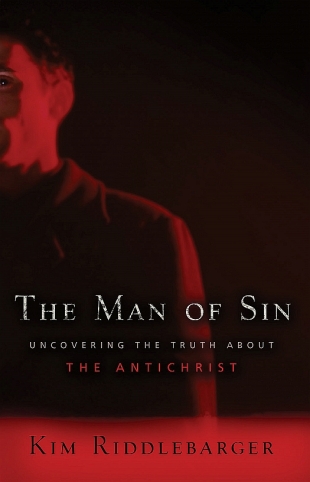Eschatology Q & A
 Wednesday, August 22, 2007 at 01:53PM
Wednesday, August 22, 2007 at 01:53PM 
Eschatology Q & A
A couple of you have asked questions recently about my book on the Antichrist, The Man of Sin. You can read more about it here, if you are not familiar with it. (Click here: Riddleblog - Man of Sin - Uncovering the Truth About Antichrist).
In light of my recent review of Hank Hanegraaff's Apocalypse Code (Click here: Riddleblog - The Latest Post - Hanegraaff's "The Apocalypse Code") , I thought this might be a good time to answer them.
___________________________
Scotty asks (August 20)
Hi Kim,
Having just read your excellent book "The Man of Sin: Uncovering the Truth About the Antichrist", your position is that a final "Man of Sin" is yet to appear in God's Temple (the Church) at the very end and in concurrence with the "falling away" (if I read correctly).
My question regarding your position is this: How do you see this unfolding in such a divided worldwide Church made up of hundreds if not thousands of denominations, affiliations, and beliefs?
In other words, no one entity currently has such mass influence over all Christians worldwide to bring about such apostasy. The only platform I can see any possibility of this occurring in is the Roman Catholic Church (through the Pope). Is this what you're alluding to or is there another scenario you envision?
Thanks.
My Answer:
Scotty, I do believe that Scripture teaches that immediately before the end of the age and the return of the Lord, there will be a mass apostasy within the church (2 Thessalonians 2:3-4; Revelation 20:7-10). When I speak of the church here, I am speaking of the visible church around the world. This would be all those church bodies which formally confess the content of the Apostle's Creed.
As you note, I believe that in the Thessalonian letter Paul is not speaking of the Jerusalem temple, but of the church. That this is not fulfilled by the events preceding the destruction of the Jerusalem temple in 70 A.D. is very clear in verse 8 of 2 Thessalonians 2, where Paul ties the revelation of this "man of lawlessness" specifically to the time of final judgment (I would recommend that you read G. K. Beale's fine commentary on 1 & 2 Thessalonians for the exegetical specifics of this).
Since the Roman church at the time of the Reformation fit the bill in many ways, I think the Reformers were largely correct to make the identification between the man of lawlessness and his particular blasphemy with the papacy. But in God's providential timing, the restraining power associated with the recovery of the gospel, prevented the Roman church from succeeding in snuffing out the Reformation and subsequent success of the gospel of free justification sola fide.
In other words, the papacy of that age manifested many of the signs mentioned by Paul, but was prevented (restrained) from overcoming the gospel through the use of church authority and state-sponsored military power (Spain, France, and Austria, specifically).
I'm with Geerhardus Vos on this one. There is a certain sense in which the only way we will know what is entailed here, is when it actually happens before our eyes. Therefore, we need to be very cautious about speculation in this regard, lest we become Reformed versions of Jack Van Impe and Hal Lindsey.
That being said, if the "composite photograph" I discuss in my book is a faithful summary of biblical teaching, this final apostasy could involve a resurgent Roman Catholic persecution of Protestants (but this is not likely), or some form of apostasy wherein professing believers bow the knee to a political leader (the false prophet, who directs the world to worship the beast, which is the God-hating civil government), bent on wiping out the church, having been empowered by the dragon (Satan) to do that very thing. This could be a secular state, trying to wipe out all religion. It could be an Islamic state trying to wipe out Christianity . . . who knows? I sure don't. But if I'm alive when it happens, I am sure that I (as well as all other believers) will know what is going on!
I really don't think we can say any more than this. But we certainly don't want to say less, either.
________________________
Jeff asks (June 2, 2007)
Dr. Riddlebarger-
Just finished "Man of Sin" and found it very helpful. Thanks for all the work and study.
My question is this...why would the great "Abomination" refer to the desecration of the Jerusalem Temple if (due to Christ's sacrifice) the temple was no longer a place of true religious ceremony? Wouldn't that make the temple's religious significance disappear,and then mean that to "desecrate" it would be no different from mistreating any other place? Maybe it is just semantics.
Thanks, Jeff
My Answer:
Let me put it this way. When Christ died on the cross, the temple veil is dramatically torn from top to bottom. This dramatic opening of the most holy place to the light of day is filled with important symbolism, not the least of which is that the sacrifices in the temple and the work of the high priest are from that moment on, rendered obsolete in light of Christ's final (once for all) sacrifice for sin. Therefore, whatever sacrifices occur in the temple and whatever role the high priest attempts to play after Christ has died, is no longer an act of worship, but an act of blasphemy.
Once Christ dies for our sins, the temple becomes Ichabod and its activities an "abomination" to the Lord. All of this culminates in the tragic Diaspora of the Jewish people and the eventual destruction of the temple by the armies of Titus in 70 A.D.
To put it another way, Christ's sacrifice does away with the temple's role in redemptive history, making way for that horrible complex of events in which Gaius (Caligula) sets up an image of himself in A.D. 40, and when the temple becomes the place where those zealots resisting the armies of Titus in the inner and outer court are mercilessly slaughtered as described by Josephus.
The point is not so much when the "Abomination" occurs (the exact moment), but that it does occur, as seen in the culmination all of these events. The temple of YHWH is rendered desolate and an abomination to God.
Hope that helps!













